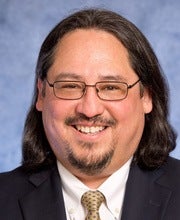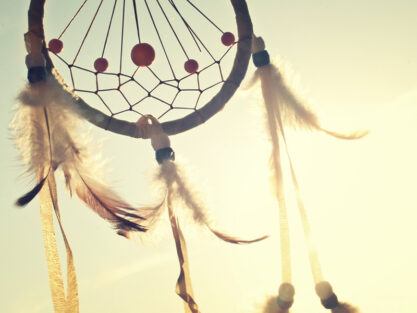Joseph Gone urged the use of traditional healing practices to treat mental health problems among Native Americans at the Yerby Diversity Lecture in Public Health
November 30, 2021 – Over the past three decades, Joseph Gone, a research psychologist focusing on Native American mental health, has learned that it’s crucial to reconcile modern psychological techniques with Indigenous cultural practices.
Gone gave the Yerby Diversity Lecture in Public Health at Harvard T.H. Chan School of Public Health on November 16. Named for the late Dr. Alonzo Smythe Yerby, a public health pioneer, former associate dean at the School, and its first Black department chair, the Yerby Lecture brings minority scientists and scholars to the School to speak on issues of diversity in public health.

Early in his career, Gone met a man on the Belknap Indian Reservation in Montana who radically changed his view of effective mental health treatment for Indigenous communities. The man, named Traveling Thunder, ascribed the wide prevalence of depression and alcohol abuse on the reservation to the years of contact with colonial European settlers, which he said had destroyed Indigenous customs. “He attributed the ‘white man system’—as he consistently referred to it—as the original pathogen for these problems,” said Gone. Traveling Thunder looked deeply askance at the psychologists with the Indian Health Service who had come to help treat mental health problems. “He identified mental health services as almost a form of missionary work, a kind of conversion effort that he described as ‘brainwashing,’” Gone recalled.
In conversations with Traveling Thunder and others, Gone came to understand that the solution to improving the notoriously underfunded mental health services on Native American reservations wasn’t simply increasing funding to expand services. Effective treatment also has to address generations of historical trauma and take into account how Native American cultures view mental health—as an issue of community healing as much as individual healing.
For instance, he noted that most mental health professionals rely on evidence-based treatment, which emphasizes faithfully following prescribed approaches and techniques, such as particular medications or talk therapy methods. In that form of treatment, the relationship between patient and therapist is less important. In traditional healing in Native communities, however, the individually customized relationship between healer and patient is crucial. “Healers are not interchangeable, but rather remain the single most important therapeutic variable,” said Gone, himself a member of the Aaniiih-Gros Ventre tribe at the Belknap reservation.
Indigenous treatments, he continued, often use rituals to harness the power of spirits or non-human intermediaries to restore community connections. Such practices challenge scientific methods of evaluation, relying instead on “the authority of narratively conveyed personal experience,” he said. And yet his own research has shown Indigenous treatments to be effective. As one tribal elder told him at a community addiction treatment program, “Every person sitting in this lodge is proof-positive that participation in these traditions can remedy addiction.”
While there is a diversity of beliefs among modern Native American people, it’s important that health professionals take such beliefs into account if they want to provide effective treatment. “Really the question that Indigenous communities are putting before us in the mental health professions is, ‘How do we navigate deep cultural discordance and persistent power asymmetries?’” Gone said. “It behooves us to consider Indigenous claims that ‘culture is our treatment.’”
Feature photo: Unsplash
